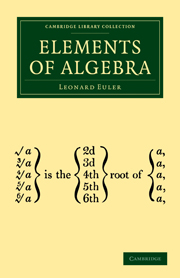Book contents
- Frontmatter
- ADVERTISEMENT
- MEMOIR OF THE LIFE AND CHARACTER OF EULER, BY THE LATE FRANCIS HORNER, ESQ., M. P.
- ADVERTISEMENT BY THE EDITORS OF THE ORIGINAL, IN GERMAN
- ADVERTISEMENT BY M. BERNOULLI, THE FRENCH TRANSLATOR
- Contents
- PART I Containing the Analysis of Determinate Quantities
- SECTION I Of the Different Methods of calculating Simple Quantities
- SECTION II Of the different Methods of calculating Compound Quantities
- SECTION III Of Ratios and Proportions
- SECTION IV Of Algebraic Equations, and of the Resolution of those Equations
- PART II Containing the Analysis of Indeterminate Quantities
- ADDITIONS BY M. DE LA GRANGE
- Advertisement
- Chap. I Of Continued Fractions
- Chap. II Solution of some New and Curious Arithmetical Problems
- Chap. III Of the Resolution in Integer Numbers of Equations of the First Degree containing two Unknown Quantities
- Chap. IV General Method for resolving in, Integer Equations of two Unknown Quantities, one of which does not exceed the First Degree
- Chap. V A direct and general Method for finding the values of x, that will render Rational Quantities of the form √(a + bx + cx2), and for resolving, in Rational Numbers, the indeterminate Equations of the second Degree, which have two Unknown Quantities, when they admit of Solutions of this kind
- Chap. VI Of Double and Triple Equalities
- Chap. VII A direct and general Method for finding all the values of y expressed in Integer Numbers, by which we may render Quantities of the form √(Ay2 + B), rational, A and B being given Integer Numbers; and also for finding all the possible Solutions, in Integer Numbers, of indeterminate Quadratic Equations of two unknown Quantities
- Chap. VIII Remarks on Equations of the Form p2=Aq2 + 1, and on the common Method of resolving them in whole Numbers
Advertisement
Published online by Cambridge University Press: 05 July 2011
- Frontmatter
- ADVERTISEMENT
- MEMOIR OF THE LIFE AND CHARACTER OF EULER, BY THE LATE FRANCIS HORNER, ESQ., M. P.
- ADVERTISEMENT BY THE EDITORS OF THE ORIGINAL, IN GERMAN
- ADVERTISEMENT BY M. BERNOULLI, THE FRENCH TRANSLATOR
- Contents
- PART I Containing the Analysis of Determinate Quantities
- SECTION I Of the Different Methods of calculating Simple Quantities
- SECTION II Of the different Methods of calculating Compound Quantities
- SECTION III Of Ratios and Proportions
- SECTION IV Of Algebraic Equations, and of the Resolution of those Equations
- PART II Containing the Analysis of Indeterminate Quantities
- ADDITIONS BY M. DE LA GRANGE
- Advertisement
- Chap. I Of Continued Fractions
- Chap. II Solution of some New and Curious Arithmetical Problems
- Chap. III Of the Resolution in Integer Numbers of Equations of the First Degree containing two Unknown Quantities
- Chap. IV General Method for resolving in, Integer Equations of two Unknown Quantities, one of which does not exceed the First Degree
- Chap. V A direct and general Method for finding the values of x, that will render Rational Quantities of the form √(a + bx + cx2), and for resolving, in Rational Numbers, the indeterminate Equations of the second Degree, which have two Unknown Quantities, when they admit of Solutions of this kind
- Chap. VI Of Double and Triple Equalities
- Chap. VII A direct and general Method for finding all the values of y expressed in Integer Numbers, by which we may render Quantities of the form √(Ay2 + B), rational, A and B being given Integer Numbers; and also for finding all the possible Solutions, in Integer Numbers, of indeterminate Quadratic Equations of two unknown Quantities
- Chap. VIII Remarks on Equations of the Form p2=Aq2 + 1, and on the common Method of resolving them in whole Numbers
Summary
The geometricians of the last century paid great attention to the Indeterminate Analysis, or what is commonly called the Diophantine Algebra; but Bachet and Fermat alone can properly be said to have added any thing to what Diophantus himself has left us on that subject.
To the former, we particularly owe a complete method of resolving, in integer numbers, all indeterminate problems of the first degree: the latter is the author of some methods for the resolution of indeterminate equations, which exceed the second degree; of the singular method, by which we demonstrate that it is impossible for the sum, or the difference of two biquadrates to be a square; of the solution of a great number of very difficult problems; and of several admirable theorems respecting integer numbers, which he left without demonstration, but of which the greater part has since been demonstrated by M. Euler in the Petersburg Commentaries.
In the present century, this branch of analysis has been almost entirely neglected; and, except M. Euler, I know no person who has applied to it: but the beautiful and numerous discoveries, which that great mathematician has made in it, sufficiently compensate for the indifference which mathematical authors appear to have hitherto entertained for such researches. The Commentaries of Petersburg are full of the labors of M. Euler on this subject, and the preceding Work is a new service, which he has rendered to the admirers of the Diophantine Algebra.
- Type
- Chapter
- Information
- Elements of Algebra , pp. 463 - 465Publisher: Cambridge University PressPrint publication year: 2009First published in: 1822



